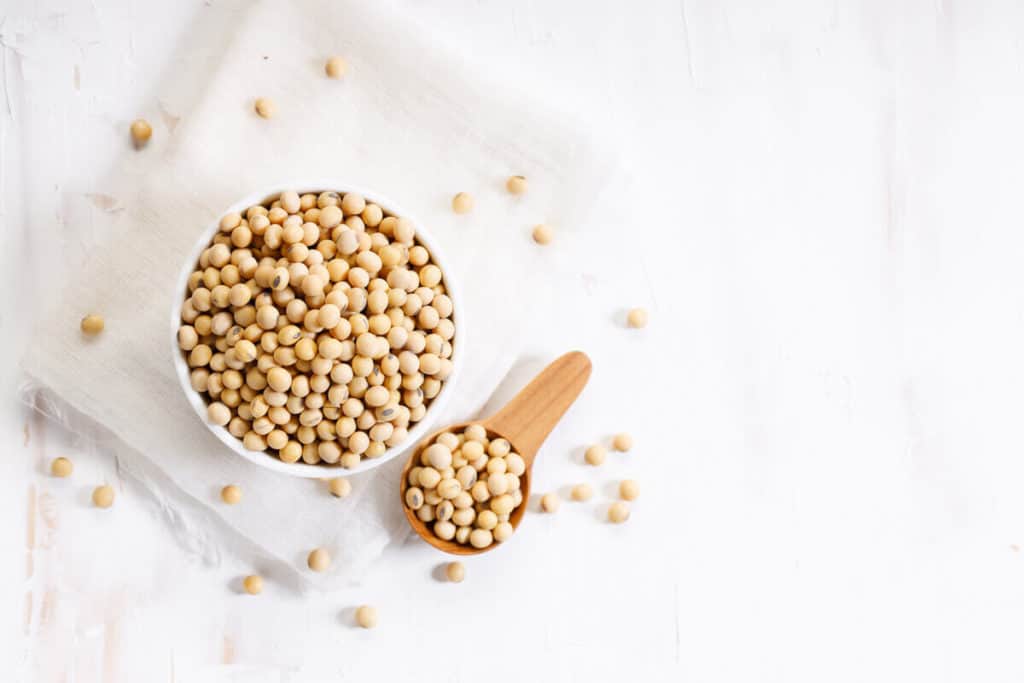What is phosphatidylserine?
Phosphatidylserine (PS) is a fatty substance, known as a phospholipid, that acts as a building block of cell membranes. PS is produced naturally by the body, but production declines with age. (19) Concentrations of PS are highest in the brain, where they comprise up to 15% of the lipid membrane. (11)(9) As a key component of the cell’s plasma membrane, PS impacts the cell’s ability to facilitate diffusion in and out of the cell, also known as membrane fluidity. Membrane fluidity is an important property needed for cell-to-cell communication. (4) Replenishing PS concentrations through diet and supplementation may help mitigate some of the negative effects aging may have on cognitive function. (5) PS supports brain function by improving concentration, memory, and language skills, all of which naturally decline with age. (14) In addition, some research suggests that PS may reduce stress levels, boost mood, and enhance athletic performance. (2)(20)Sources of phosphatidylserine
PS is found in small amounts in certain foods; however, it can be difficult to get enough through diet alone. (19) Food sources of phosphatidylserine, include:- Eggs
- Fish
- Legumes (e.g., soybeans, white beans)
- Organ meats (e.g., chicken and beef liver)
- Sunflower seeds (21)

Phosphatidylserine benefits
Researchers have conducted numerous studies on the health benefits of PS.Improves cognitive function
PS crosses the blood-brain barrier where it slows or repairs nerve cell damage. Supplementation improves several cognitive functions, including improved short and long-term memory and the ability to recall information. PS may also improve concentration, communication, and language skills. (5) One study investigated the effects of PS supplementation in healthy adults ranging between the ages of 50 and 90 with memory complaints. After 12 weeks of daily supplementation, several markers of cognitive function, including memory recall, memory recognition, and mental flexibility, significantly improved. (22) Alzheimer’s disease, a progressive brain disorder characterized by loss of cognitive function, may also be improved with PS supplementation. PS may be effective in reducing the buildup of amyloid-beta protein in the brain, which is believed to be one of the main contributors to Alzheimer’s disease. (6)(1) One study determined that PS may improve memory in Alzheimer’s disease patients. Vocabulary and picture matching scores were also higher in the study group supplementing with PS than the group not receiving supplementation. (23)
Reduces stress and boosts mood
Supplemental PS may help maintain normal levels of cortisol. Cortisol is the body’s primary stress hormone, which is produced by the adrenal cortex in response to physical and emotional stress. (7) Elevated cortisol levels can increase blood pressure, heart rate, and respiration, serving as protection against immediate threats and short-term stressful situations. However, chronically elevated cortisol can contribute to certain health conditions, including heart disease, diabetes, and neurodegenerative disorders. (15) One study found that supplementation of PS reduced adrenocorticotropic hormone (ACTH), a hormone released by the pituitary gland in response to stress and responsible for prompting the release of cortisol. As a result, cortisol levels were normalized in these highly stressed individuals. (7) Some research suggests that PS supplementation may also improve mood. (2) It is suspected that PS may positively impact mood by stimulating the release of dopamine in the brain, a neurotransmitter responsible for regulating the brain’s pleasure and reward systems. (16) One study investigated the effects of PS on stress and mood. Following one month of daily supplementation, overall mood improved and feelings of stress decreased among participants. (2)May benefit children with attention-deficit/hyperactivity disorder
Attention deficit/hyperactivity disorder (ADHD) is a common behavioral disorder in children, characterized by poor attention, impulsiveness, and hyperactivity. Some research has found that supplementing with PS can reduce the symptoms of ADHD in children. (10) A randomized, double-blind clinical trial of 36 children with ADHD saw improvements in inattentiveness and impulsivity after two months of daily PS supplementation. (8)Decreases muscle soreness and improves athletic performance
Supplementing with PS following a workout may decrease perceived muscle soreness, as well as reduce elevated cortisol levels, which may occur as a result of overtraining. (12) One study found that PS supplementation reduced the cortisol response to intensive resistance training by 20%. (20) Elevated cortisol may result in a loss of muscle mass and strength by increasing insulin and breaking down proteins, which is especially problematic for aging adults, as well as athletes looking to improve performance. (3) Research has also shown that PS supplementation may improve athletic performance during certain endurance exercises, such as cycling and running, by significantly delaying the onset of fatigue. (13)Safety considerations
PS is generally well-tolerated and safe for most individuals, including older adults and children. (21)(17) Due to the risk of infectious disease occasionally found in some sources of bovine brain, PS supplements derived from plant sources, such as soy, are considered safer alternatives. (22)The bottom line
Supplementing with phosphatidylserine has been shown to offer many benefits, including improved mood, cognitive function, and athletic performance. If you are a patient, consult your integrative healthcare practitioner for specific recommendations before adding phosphatidylserine to your supplement regimen.- Alzheimer’s Association. (2017, March). Beta-amyloid and the amyloid hypothesis. Retrieved from https://www.alz.org/national/documents/topicsheet_betaamyloid.pdf
- Benton, D., Donohoe, R. T., Sillance, B., & Nabb, S. (2001). The influence of phosphatidylserine supplementation on mood and heart rate when faced with an acute stressor. Nutritional Neuroscience, 4(3), 169–178.
- Braun, T. P., & Marks, D. L. (2015). The regulation of muscle mass by endogenous glucocorticoids. Frontiers in Physiology, 6, 12.
- Gestuvo, M., & Hung, W. (2012). Common dietary supplements for cognitive health. Aging Health, 8(1), 89–97.
- Glade, M. J., & Smith, K. (2015). Phosphatidylserine and the human brain. Nutrition, 31(6), 781–786.
- Hashioka, S., Han, Y.-H., Fujii, S., Kato, T., Monji, A., Utsumi, H., … Kanba, S. (2007). Phosphatidylserine and phosphatidylcholine-containing liposomes inhibit amyloid β and interferon-γ-induced microglial activation. Free Radical Biology and Medicine, 42(7), 945–954.
- Hellhammer, J., Vogt, D., Franz, N., Freitas, U., & Rutenberg, D. (2014). A soy-based phosphatidylserine/ phosphatidic acid complex (PAS) normalizes the stress reactivity of hypothalamus-pituitary-adrenal-axis in chronically stressed male subjects: a randomized, placebo-controlled study. Lipids in Health and Disease, 13(1), 121.
- Hirayama, S., Terasawa, K., Rabeler, R., Hirayama, T., Inoue, T., Tatsumi, Y., … Jäger, R. (2013). The effect of phosphatidylserine administration on memory and symptoms of attention-deficit hyperactivity disorder: a randomised, double-blind, placebo-controlled clinical trial. Journal of Human Nutrition and Dietetics, 27, 284–291.
- Jäger, R., Purpura, M., & Kingsley, M. (2007). Phospholipids and sports performance. Journal of the International Society of Sports Nutrition, 4(1), 5.
- Kidd, P. M. (2000). Attention deficit/hyperactivity disorder (ADHD) in children: Rationale for its integrative management. Alternative Medicine Review, 5(5), 402–428.
- Kim, H.-Y., Huang, B. X., & Spector, A. A. (2014). Phosphatidylserine in the brain: Metabolism and function. Progress in Lipid Research, 56, 1–18.
- Kinglsey, M. I., Miller, M., Kilduff, L. P., McEneny, J., & Benton, D. (2006). Effects of phosphatidylserine on exercise capacity during cycling in active males. Medicine & Science in Sports & Exercise, 38(1), 64–71.
- Kingsley, M. (2006). Effects of phosphatidylserine supplementation on exercising humans. Sports Medicine, 36(8), 657–669.
- Küllenberg, D., Taylor, L. A., Schneider, M., & Massing, U. (2012). Health effects of dietary phospholipids. Lipids in Health and Disease, 11(1), 3.
- Lee, D. Y., Kim, E., & Choi, M. H. (2015). Technical and clinical aspects of cortisol as a biochemical marker of chronic stress. BMB Reports, 48(4), 209–216.
- Maggioni, M., Picotti, G. B., Bondiolotti, G. P., Panerai, A., Cenacchi, T., Nobile, P., & Brambilla, F. (1990). Effects of phosphatidylserine therapy in geriatric patients with depressive disorders. Acta Psychiatrica Scandinavica, 81(3), 265–270.
- Manor, I., Magen, A., Keidar, D., Rosen, S., Tasker, H., Cohen, T., … Weizman, A. (2013). Safety of phosphatidylserine containing omega3 fatty acids in ADHD children: A double-blind placebo-controlled trial followed by an open-label extension. European Psychiatry, 28(6), 386–391.
- Salthouse, T. A. (2009). When does age-related cognitive decline begin? Neurobiology of Aging, 30(4), 507–514.
- Scholey, A., Camfield, D., Owen, L., Pipingas, A., & Stough, C. (2011). Functional foods and cognition. Functional Foods, 277–308.
- Starks, M. A., Starks, S. L., Kingsley, M., Purpura, M., & Jäger, R. (2008). The effects of phosphatidylserine on endocrine response to moderate intensity exercise. Journal of the International Society of Sports Nutrition, 5(1), 11.
- U.S. Food and Drug Administration . (2016). GRAS notice 636: Phosphatidylserine derived from soy lecithin. Retrieved from https://www.fda.gov/media/98564/download
- Zchut, S., Richter, Y., Herzog, Y., Lifshitz, & Hayun. (2013). The effect of soybean-derived phosphatidylserine on cognitive performance in elderly with subjective memory complaints: a pilot study. Clinical Interventions in Aging, 8, 557–563.
- Zhang, Y. Y., Yang, L. Q., & Guo, L. M. (2015). Effect of phosphatidylserine on memory in patients and rats with Alzheimer’s disease. Genetics and Molecular Research, 14(3), 9325–9333.





